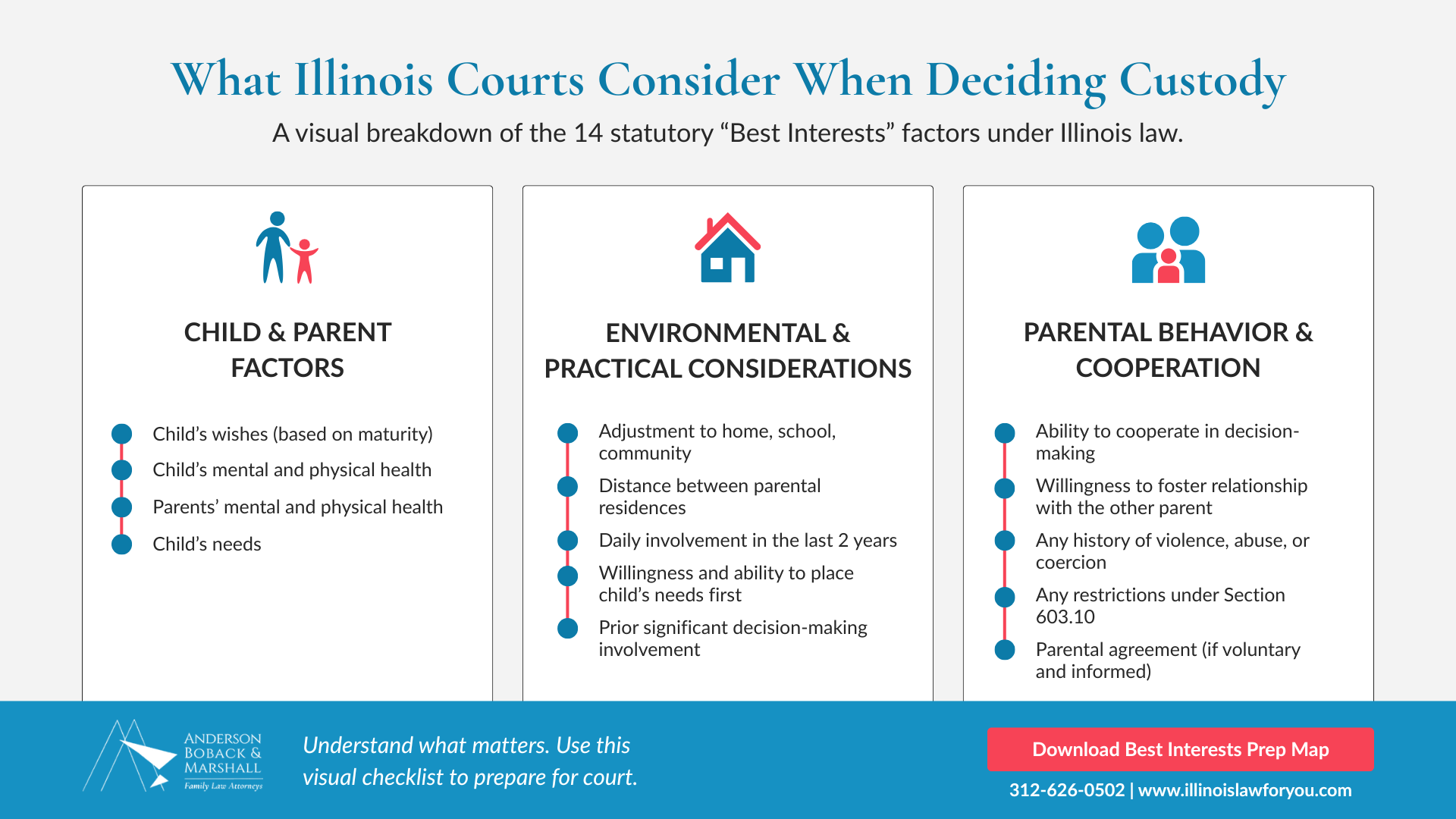Getting ready to meet with a child custody attorney can make all the difference in your case. Most parents worry about what to bring and what to say. Your first consultation sets the foundation for your case, so good preparation matters.
Illinois law no longer uses the term “child custody.” Instead, courts now refer to “allocation of parental responsibilities” and “parenting time.” This updated terminology better reflects the goal of ensuring both parents remain involved in their children’s lives when possible. Understanding these terms helps you communicate your goals clearly.
The right information helps the attorney understand your situation quickly. This saves you time and money while getting your case moving forward faster. Parents who come prepared often feel more confident and get more value from that initial consultation.
Our family law attorneys at Anderson, Boback & Marshall have guided Illinois parents through these matters for many years. We’ve seen how preparation makes a difference in outcomes.
In this guide, we outline what to gather before your meeting, important questions to consider, and how these parenting laws might affect your case. With the right preparation, you can take this important first step with confidence.
1. Know Your Timeline
One of the first things the attorney will ask is for a timeline of key events in your family’s history. Be ready to provide:
- When you and your co-parent began the relationship
- When you and your co-parent broke up or separated
- When your child or children were born.
- Where your child has primarily lived since birth.
- If either parent moved to a different state, when that happened.
Having these dates ready will help the attorney understand jurisdictional issues and build a stronger case.
Dates and timelines play a crucial role in jurisdictional issues—courts may have different rules depending on how long a child has lived in a particular state. Being precise about dates can prevent legal complications later on.

2. Explain Whether It’s an Emergency
The attorney will want to know if your case requires immediate legal action or if it can go through the standard legal process.
Emergencies might include:
- Immediate threats to the child’s physical, emotional, or mental well-being.
- A co-parent withholds visitation or violates an existing parenting time order.
- Cases of domestic violence, substance abuse, or neglect.
If you believe your case is urgent, provide evidence such as police reports, medical records, messages, or witness statements. The attorney can then determine whether to file for an emergency parenting time order or follow the standard legal process.
3. Think About Your Children and Their Unique Needs
This may seem obvious, but it’s often overlooked. Your family law case must focus on your child’s best interests, which is the legal standard courts use. Be prepared to discuss:
- Your child’s personality, needs, and challenges. Does your child have medical conditions, disabilities, or educational needs that require special care?
- Your child’s daily routine. Who takes them to school? Who helps with homework? Who attends doctor’s appointments?
- Your involvement in their lives. Do you participate in extracurricular activities, school meetings, or major decisions?
Courts consider which parent is more involved in the child’s life when making custody decisions. Providing specific examples of how you meet your child’s needs can strengthen your case.
Visit our Chicago Child Custody Lawyers page to learn more
4. Evaluate Existing Parenting Arrangements
Before walking into your consultation, ask yourself: What’s working and what’s not?
- Do you and your co-parent already have a custody schedule that works?
- Are there frequent disputes over parenting time?
- Does the other parent fail to follow agreements (e.g., skipping visits or refusing to communicate)?
If an informal parenting time arrangement exists, courts may be reluctant to change it unless you show that it’s not working. Be prepared to explain why modifications are necessary.
5. Identify Any Safety or Well-Being Concerns
If your co-parent’s behavior negatively affects your child’s well-being, be prepared to discuss it.
Potential concerns include:
- Domestic violence or emotional abuse.
- Substance abuse issues.
- Neglect (e.g., not providing food, clothing, or medical care).
- Unsafe home environment.
If safety is a concern, bring evidence (police reports, medical records, messages, social media posts, etc.). False accusations can damage credibility, so it’s crucial to have supporting documentation.
6. Think About Your Co-Parent’s Role
Rather than viewing your co-parent as an adversary, consider how their role fits into your child’s life.
- Are they generally a good parent, but do you need a formal agreement to reduce conflicts?
- Do they struggle with co-parenting but still play an important role in your child’s life?
- Are there serious issues (abuse, neglect, or substance use) that make co-parenting unsafe?
Courts prefer co-parenting arrangements unless there’s a significant reason to limit the other parent’s access. Being objective about your co-parent’s strengths and weaknesses helps the attorney build a realistic case.
7. Prepare Questions for the Family Law Attorney
Ask questions about the law firm and its attorneys. Your first meeting is your chance to determine if this attorney is the right fit for your case.
Some key questions to ask:
- How much experience do you have handling child custody cases?
- What strategies do you recommend based on my situation?
- How do judges in this jurisdiction typically handle cases like mine?
- What are my strongest and weakest points in this custody battle?
- What are your fees and billing structure?
Understanding the attorney’s approach, costs, and billing structure upfront prevents financial surprises and helps build trust.
8. Maintain a Cooperative Mindset (When Possible)
Family law battles can be emotional, but courts favor parents who show a willingness to co-parent (except in cases involving safety risks).
Consider:
- Are you open to mediation?
- Can you communicate civilly with your co-parent about parenting decisions?
- Would a structured custody agreement reduce conflicts?
If cooperation is possible, mediation or a negotiated parenting plan can be quicker, cheaper, and less stressful than a court battle.
Why Choose Anderson Boback & Marshall?
At Anderson Boback & Marshall, we understand that every child custody case is unique and deeply personal. The more detail and information you can provide at your first meeting, the better prepared we will be to develop a strong legal strategy that protects your rights and your child’s best interests.
Our experienced attorneys are committed to guiding you through this process with clarity, compassion, and aggressive representation when needed. Contact us today to schedule a consultation and take the first step toward securing the custody arrangement that you and your children deserve.
















